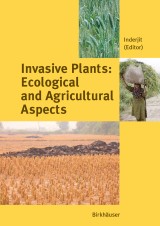Details

Invasive Plants: Ecological and Agricultural Aspects
|
181,89 € |
|
| Verlag: | Birkhäuser |
| Format: | |
| Veröffentl.: | 16.01.2006 |
| ISBN/EAN: | 9783764373801 |
| Sprache: | englisch |
| Anzahl Seiten: | 301 |
Dieses eBook enthält ein Wasserzeichen.
Beschreibungen
<P>Invasive plants have an impact on global biodiversity and ecosystem function, and their management is a complex task.</P>
<P>The aim of this book is to discuss fundamental questions of invasion ecology, such as why particular communities become more invasible than others, what the mechanisms of exclusion of native species by invaders are, and whether invasion can be predicted. <BR>In addition, agricultural practices influencing invasion, the environmental and economic costs of invasion as well as possible management strategies are discussed. Readers will get a unique perspective on invasion ecology through employing general principles of ecology to plant invasions.</P>
<P>The aim of this book is to discuss fundamental questions of invasion ecology, such as why particular communities become more invasible than others, what the mechanisms of exclusion of native species by invaders are, and whether invasion can be predicted. <BR>In addition, agricultural practices influencing invasion, the environmental and economic costs of invasion as well as possible management strategies are discussed. Readers will get a unique perspective on invasion ecology through employing general principles of ecology to plant invasions.</P>
In search of an operational lexicon for biological invasions.- Ecological aspects.- The ecology of biological invasions: past, present and future.- Ecological niche models and the geography of biological invasions: a review and a novel application.- Importance of species replication in understanding plant invasions into North American grasslands.- Residence time determines the distribution of alien plants.- The relationship between community diversity and exotic plants: cause or consequence of invasion?.- Invasive plants: the process within wetland ecosystems.- Understanding invasions: the rise and fall of diffuse knapweed (Centaurea diffusa) in North America.- Defining a regional approach for invasive plant research and management.- Allelopathy as a mechanism for resisting invasion: the case of Polygonella myriophylla.- Agricultural aspects.- Ecology and management of an exotic weed Phalaris minor.- Reducing agroecosystem vulnerability to weed invasion.- Tillage intensity affects weed communities in agroecosystems.- Distribution and biological control of Chromolaena odorata.- Biology and anthropology of plant invasions.- Characteristics, significance, and human dimension of global invasive weeds.- Environmental consequences and economic costs of alien species.
About the Editor<BR>Inderjit is professor in the centre for Environmental Management of Degraded Ecosystems (CEMDE), School of Environmental Studies, University of Delhi. He works on allelochemical interactions among and between plants at the ecosystem-level, plant invasions, ecology and management of herbicide resistant weeds, and ecophysiology of allelochemicals. Inderjit is interested in understanding factors that explain habitat invasibility, invasiveness and dominance of alien plant species in natural and agroecosystems. Inderjit is an experienced author and editor of several scientific books.
<P>The study of plant invasions is the science that attempts to understand causes and consequences of plant introductions outside of their native areas. Invasive plants have an impact on global biodiversity and ecosystem function, and their management is a complex and formidable task. The applied aspects of this study include the health and economic impacts of invasions. Although research on plant invasions has progressed remarkably during the past several decades, scientists are still looking for answers to basic questions. Such questions are: (1) What are invaders? (2) Can we predict invaders? (3) What are mechanisms of exclusion of native species by invaders? (4) How general principles in ecology can be used to predict and understand plant invasions? (5) What makes a habitat susceptible to invasion? (6) What agricultural practices influence invasion? (7) What impact invaders may have on ecosystem processes and community structure? (8) What are causes, mechanisms and consequences of plant invasions (9) What are the environmental and economic costs of invasion? (10) What management strategies are needed to check invasion? In an effort to answer these questions, contributing authors have strived to provide up-to-date reviews and discussions of invasion-related research involving natural and agroecosystems. Readers will get a unique perspective on ecological and agricultural aspects of plant invasions through employing general principles of ecology to plant invasions.</P>
A timely topic receiving increased attention Selected papers from an international symposium at the University of Delhi, India International and experienced authorship
-
-
© 2024 media control GmbH
Alle Preise enthalten die gesetzliche Mehrwertsteuer. - AGB
- Impressum
- Datenschutzerklärung
- Kontakt
- FAQ
- Mein Konto
- Home
- Erweiterte Suche
- Widerrufsrecht
- Reader-Software
- Desktop-Ansicht
- Gutschein-Code einlösen


